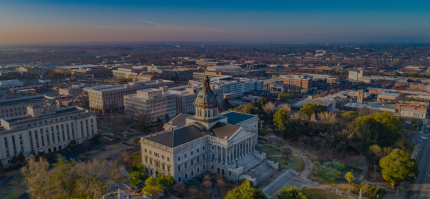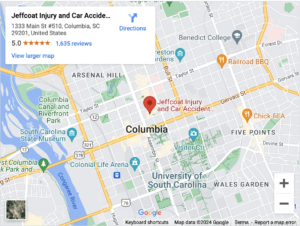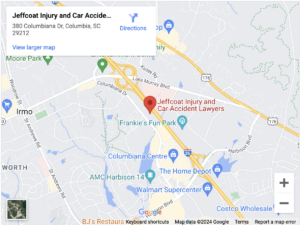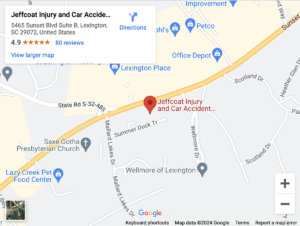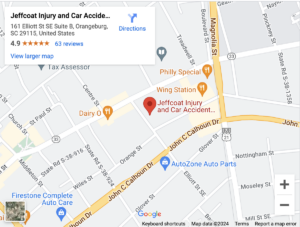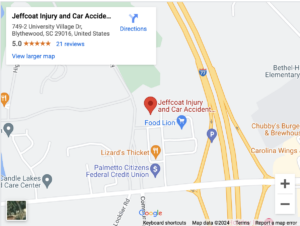April 24, 2025 | Columbia Personal Injury Blog \ Uber Accident Lawyer Near You

Injured in an Uber or Lyft? What Every Passenger Needs to Know About Compensation
Rideshare accidents can leave passengers dealing with unexpected injuries, mounting medical bills, and lost wages—all while navigating complex insurance policies and claims processes. If you’ve been injured as a passenger in a rideshare accident in South Carolina, you have rights to compensation that many victims don’t fully understand or pursue. The moments after a rideshare collision are crucial for protecting your ability to receive fair compensation, but many passengers make critical mistakes that limit their recovery. Understanding these situations can mean distinguishing between a denied claim and full compensation for your injuries.
Don’t let the complexities of a rideshare accident claim overwhelm you. Reach out to Jeffcoat Injury and Car Accident Lawyers to ensure you’re on the right path to securing the compensation you deserve. Give us a call at (803) 200-2000 or contact us today to discuss your case.

Understanding South Carolina Rideshare Passenger Rights and Insurance Coverage
South Carolina law provides specific protections for rideshare passengers involved in accidents. Unlike traditional taxi services, companies like Uber and Lyft operate under a unique insurance structure that changes depending on the driver’s status at the time of the accident. When a driver is actively transporting a passenger, rideshare companies typically provide up to $1 million in liability coverage—significantly more than the state minimum requirements for personal auto insurance. However, this coverage isn’t automatically applied, and insurance companies often look for ways to minimize payouts. Understanding the multi-layered insurance coverage in rideshare accidents is essential for maximizing compensation. Beyond the rideshare company’s policy, you may also have claims against the driver’s insurance, other vehicles involved in the accident, or even your own uninsured/underinsured motorist coverage. Each of these potential sources requires different approaches to secure proper compensation.
Critical Steps to Take Immediately After a Rideshare Accident in Columbia
Your actions in the hours and days following a rideshare accident dramatically impact your ability to receive fair compensation. Many passengers don’t realize that rideshare companies have specialized teams to minimize their liability after accidents. According to transportation safety reports, only about 30% of rideshare passengers take all the necessary steps to protect their claims after an accident. Following these essential steps can help ensure you don’t leave money on the table:
How a Dedicated Rideshare Accident Attorney Can Maximize Your Compensation
Rideshare accident claims involve multiple insurance policies, corporate interests, and complex liability issues that most passengers aren’t equipped to navigate alone. Insurance companies representing Uber and Lyft have teams of attorneys whose sole purpose is to minimize payouts. At Jeffcoat Injury and Car Accident Lawyers, we’ve found that rideshare accident victims who work with specialized attorneys receive, on average, 3.5 times more compensation than those who attempt to handle claims independently. Our team understands the nuances of rideshare coverage in South Carolina and how to identify all potential sources of compensation. We conduct thorough investigations to determine if driver negligence, company policy violations, or vehicle defects contributed to your injuries. By handling all communications with insurance adjusters, we protect you from making statements that could harm your claim while building a compelling case for maximum compensation.
Understanding the Unique Challenges of Rideshare Accident Claims
Rideshare accident claims differ significantly from traditional auto accident cases in ways that directly impact compensation. One major challenge involves determining which insurance policy applies at the specific moment of the accident. Rideshare drivers operate under different coverage levels depending on whether they’re waiting for a ride request, en route to pick up a passenger, or actively transporting someone. This shifting coverage model creates opportunities for insurance companies to dispute liability or attempt to apply lower coverage limits. Additionally, evidence collection in rideshare accidents requires specific technical knowledge, including how to obtain and preserve digital evidence from the rideshare app that shows the driver’s status, route deviations, or speed at the time of the accident.
The Impact of Rideshare Driver Classification on Your Claim
South Carolina law classifies rideshare drivers as independent contractors rather than employees, which has significant implications for your compensation claim. This classification means that while the rideshare company provides insurance coverage, they often attempt to distance themselves from direct liability for driver actions. We’ve seen countless cases where this independent contractor status creates obstacles for victims seeking fair compensation. In our experience, successfully navigating these classification challenges requires a strategic approach that leverages both the rideshare company’s insurance obligations and the driver’s independent liability.
Calculating Full Compensation: Beyond Medical Bills
Many rideshare accident victims focus solely on immediate medical expenses, not realizing they may be entitled to significantly more compensation. A comprehensive claim should account for all damages—both economic and non-economic. Economic damages include quantifiable losses like medical expenses (both current and future), rehabilitation costs, lost wages, reduced earning capacity, and property damage. Non-economic damages cover intangible losses like pain and suffering, emotional distress, loss of enjoyment of life, and permanent impairment or disfigurement..
Documenting Long-Term and Hidden Injuries
Soft tissue injuries, traumatic brain injuries, and psychological trauma often develop or worsen in the weeks and months following a rideshare accident. Insurance companies frequently offer quick settlements before the full extent of these injuries becomes apparent. Proper medical documentation is essential for connecting these delayed-onset conditions to the original accident. This includes following through with all recommended treatments, attending follow-up appointments, and maintaining a daily journal documenting how your injuries affect your daily life. Medical experts and life-care planners can help calculate the projected lifetime costs of serious injuries, ensuring your settlement accounts for future needs.
Negotiating with Rideshare Insurance Companies: Tactics and Pitfalls
Rideshare companies and their insurers employ sophisticated tactics to reduce claim payouts. Understanding these strategies can help protect your right to fair compensation. Initial settlement offers typically represent a fraction of what your claim is worth, banking on your need for immediate funds. Adjusters often request recorded statements, hoping you’ll make inconsistent statements they can use to devalue your claim. They may also monitor your social media for posts that contradict your injury claims or suggest you’re recovering faster than stated. Some even deploy delay tactics, knowing financial pressure might force you to accept a lower settlement rather than wait for fair compensation.
The Power of Litigation Preparation in Settlement Negotiations
While most rideshare accident claims settle without going to trial, preparing your case as if it will go to court significantly increases your leverage during negotiations. This includes thorough evidence collection, expert witness consultations, and comprehensive documentation of all damages. Insurance companies assess their risk based on your attorney’s reputation for taking cases to trial when settlements are inadequate. Having a rideshare accident attorney with trial experience signals to insurance companies that you’re prepared to fight for full compensation rather than accept an inadequate offer, often resulting in higher settlement proposals.
Special Considerations for Rideshare Accidents in South Carolina
South Carolina’s comparative negligence law adds another layer of complexity to rideshare accident claims. Under this rule, your compensation may be reduced by the percentage of fault assigned to you, and you cannot recover if you’re found more than 50% responsible for the accident. While passengers rarely bear significant fault, insurance companies may attempt to argue you distracted the driver or failed to wear a seatbelt. Additionally, South Carolina’s dram shop laws may come into play if your rideshare driver was under the influence of alcohol, potentially adding the establishment that served them as another liable party.
How Local Columbia Traffic Patterns Affect Rideshare Accident Claims
The unique traffic conditions in downtown Columbia, particularly around USC, the Vista, and major hospitals, create specific accident scenarios that can strengthen your claim. Rush hour congestion near major employers and high pedestrian areas like Five Points present distinct risks for rideshare vehicles. Understanding how these local factors contribute to accidents can help establish liability and demonstrate that your driver failed to exercise appropriate caution in known high-risk areas. Weather conditions, road construction, and special events that affect traffic patterns can also play crucial roles in establishing the full context of your accident.
Frequently Asked Questions
1. How long must I file a rideshare accident lawsuit in South Carolina?
In South Carolina, you generally have three years to file a personal injury lawsuit from the accident date. However, this doesn’t mean you should wait to take action. Evidence disappears quickly, witness memories fade, and rideshare data may be overwritten. Additionally, the rideshare company’s insurance requires prompt notification of accidents. It’s best to consult with a rideshare accident lawyer in Columbia as soon as possible after your accident to ensure all deadlines are met and evidence is preserved.
2. What if the rideshare driver was at fault but didn’t have their insurance?
Even if the rideshare driver lacks adequate personal insurance, you still have options for compensation. When a driver is actively transporting a passenger, Uber and Lyft provide up to $1 million in liability coverage regardless of the driver’s personal insurance status. This coverage is specifically designed to protect passengers. A Columbia rideshare accident attorney can help you navigate the claims process and ensure the rideshare company’s insurance fulfills its obligations to cover your injuries and damages.
3. Can I still receive compensation if I didn’t seek medical attention immediately after my rideshare accident?
While delayed medical treatment can complicate your claim, it doesn’t automatically disqualify you from receiving compensation. However, insurance companies often argue that delays in seeking treatment indicate less severe injuries or suggest the injuries came from another cause. If you delayed treatment, a Columbia Uber accident lawyer can help document how your symptoms developed over time and establish the connection between the accident and your injuries through medical expert testimony and other evidence.
4. How is compensation calculated for rideshare accident victims in South Carolina?
Compensation in South Carolina rideshare accident claims typically includes economic damages (medical expenses, lost wages, property damage) and non-economic damages (pain and suffering, emotional distress, loss of enjoyment of life). The calculation considers factors such as injury severity, treatment duration, permanent impairments, impact on daily activities, and future medical needs. South Carolina has no statutory caps on most personal injury damages, meaning there’s no artificial limit on your potential compensation. A rideshare victim compensation expert can properly value your claim based on similar cases and specific circumstances.
5. What if my rideshare accident involved multiple vehicles? Who pays for my injuries?
In multi-vehicle rideshare accidents, multiple insurance policies may be responsible for your compensation. These could include the rideshare company’s policy, the rideshare driver’s personal insurance, other drivers’ insurance policies, and potentially your own uninsured/underinsured motorist coverage. South Carolina transportation accident claims involving multiple parties require careful investigation to determine each party’s percentage of fault. A Columbia Lyft injury attorney can help identify all potential sources of compensation and pursue claims against each responsible party to maximize your total recovery.
Work with a Rideshare Accident Lawyer
Navigating a rideshare accident claim requires specialized knowledge of both South Carolina personal injury law and the unique insurance structures of companies like Uber and Lyft. Jeffcoat Injury and Car Accident Lawyers’ attorneys understand these cases’ complexities and are committed to helping passengers recover the full compensation they deserve. From investigating the accident and identifying all liable parties to calculating comprehensive damages and negotiating with powerful insurance companies, having proper legal representation makes a measurable difference in the outcome of your case. If you’ve been injured as a rideshare passenger, consulting with an attorney who focuses on these specialized claims can help ensure your rights are protected and your recovery is prioritized during this challenging time.
When the road gets rough after a rideshare accident, let Jeffcoat Injury and Car Accident Lawyers steer you toward the compensation you deserve. Don’t hesitate to reach out at (803) 200-2000 or contact us to discuss your case and secure your rightful recovery.
